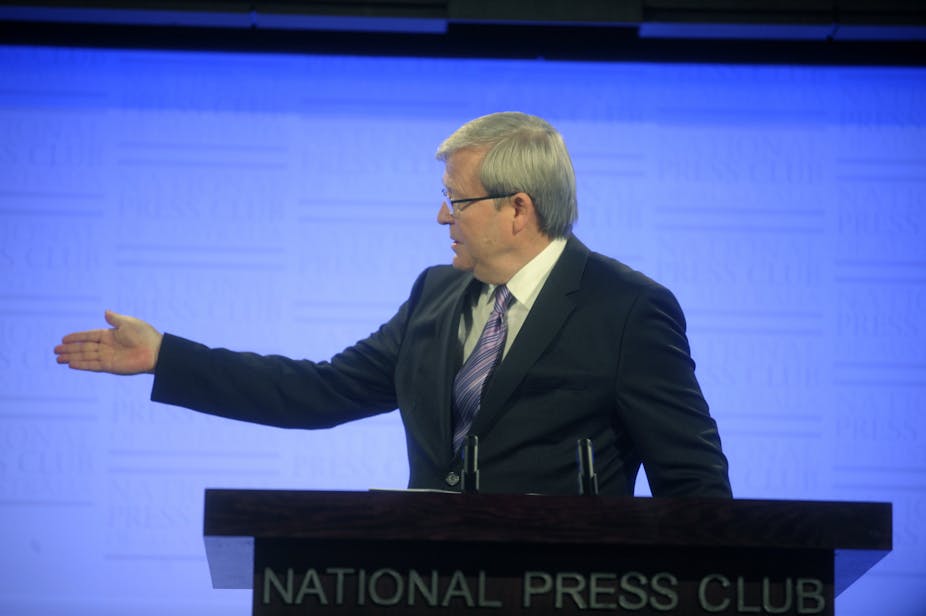Kevin Rudd has set out a “national competitiveness agenda” for Australia and said the nation must lift its annual productivity growth rate to 2% or better.
Addressing the National Press Club, the Prime Minister said government, business and unions had to work closely together, “pushing in the same strategic policy direction for the overall wellbeing of our national economy.”
Promoting the idea of a government-business-union productivity pact, he strongly repudiated the language of class warfare adopted by some in the Gillard government. “I have never believed in class warfare.”
Rudd reprised the “three P’s” - population, workforce participation and productivity - that he promoted as prime minister in 2010.
The PM’s push for a productivity pact came as Australia’s unemployment rate rose to 5.7% in June, the highest in nearly four years, and up from a revised 5.6% in May.
Rudd recommitted the government to sticking by the commitments in the May budget, including achieving balance in 2015-16. “The government will maintain a prudent approach to fiscal policy, returning the budget to surplus across the economic cycle,” he said.
Rudd has met four times with the Business Council of Australian and the ACTU since wresting back the leadership a fortnight ago, to discuss a competitiveness agenda for managing the transition from the mining sector’s investment-intensive phase towards focus on new investment in other sectors, including the trade sector, which will be helped by the falling dollar.
“We need to aim for a productivity number with a "2” in front of it,“ Mr Rudd said. "And to get there we need to bring the nation together, not pull it apart,” Rudd said. Average labour productivity growth had fallen to 1.4% in the past decade, although it rose to 1.6% over the year to March.
He listed seven elements of his competitiveness agenda.
Tacking electricity prices, which “are too high by global standards”. While including the impact of the carbon price, he stressed that was only a minor factor in electricity costs. “The primary reason for the hike in electricity prices appears to be the current system of national electricity regulation”.
Examining any unintended rigidities in the labour market. His focus was on making more effective use of the flexibility within the present Fair Work Act rather than changing that system.
Improving business productivity. He said that some bad industrial outcomes for some major projects were the result of bad management decisions rather than union hostility, and also pointed out that not enough business executives had experience working in Asia.
Dealing with the burden of regulation on business, particularly the multiple and conflicting environmental assessment requirements. “Surely we should aim at having one single integrated assessment system.”
Improving education, skills and training. Progress had been made but there was more to do, for example with vocational education and training.
Expanding infrastructure, with the need to embrace new forms of infrastructure financing.
Improving the operating environment for small business, including its access to capital. “As Prime Minister, I am passionate about the future of small business.”
A number of these areas, such as electricity pricing and streamlining environmental assessment - were highlighted by the Gillard government, but ran into road blocks.
Answering questions, Rudd indicated he was willing to be flexible about his proposed changes for the election of Labor leaders. Under the system he has put forward, it would take a petition of three quarters of the Labor caucus to get a leadership vote. But Rudd made it clear that his concern was particularly to ensure that the position of the Prime Minister was secure - he was not so concerned about an opposition leader. Some in the Labor party are suggesting the trigger point should be lower in opposition.
Rudd distanced himself from an aspirant for Julia Gillard’s seat of Lalor, Lisa Clutterham, who admitted in an ABC interview today that she had no connection with Melbourne. “I have visited Melbourne. Melbourne’s a great city,” she said. Clutterham is a Foreign Affairs officer and only joined the Labor Party less than a month ago.
“I’m in the majority, the majority of Australians, 99% of whom are not members of political parties,” she said.
Rudd said he thought the interview was pretty “surprising” and “curious”.

